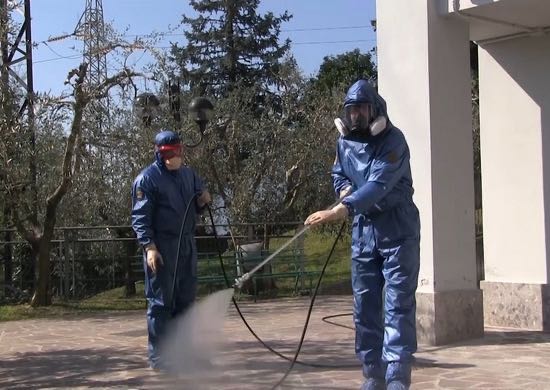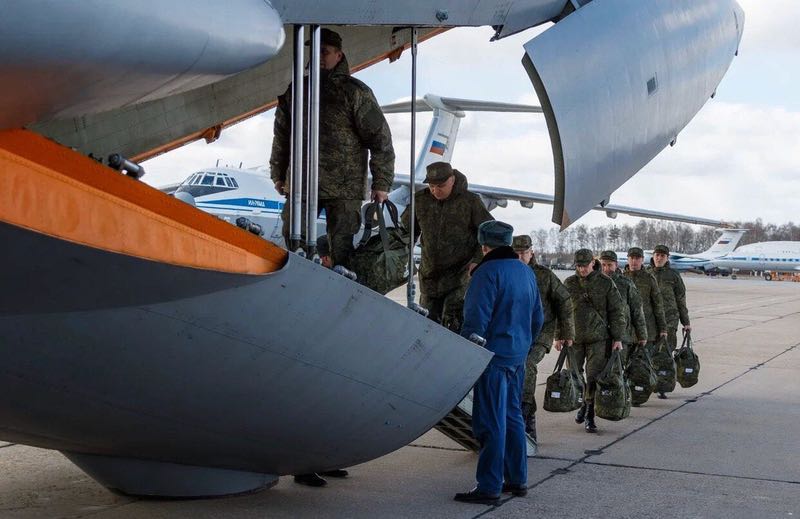Italian newspapers criticised Russia's humanitarian aid to Italy as a propaganda tool and espionage. But international aid always has a selfish side, argues our columnist Mark Galeotti. Likewise it is a hostile reflex to see coordinated Kremlin warfare in every conspiracy theory. A plea for unorthodox thinking in times of plague.
 Russian military help disinfect hospitals in Bergamo (picture Russian ministry of Defense)
Russian military help disinfect hospitals in Bergamo (picture Russian ministry of Defense)
Is the COVID-19 crisis a genuine opportunity for antagonists to find common ground, or just an opportunity cynically to play that role for naked self-interest? Or both? Everyone’s answer to that may well simply reflect their assumptions about the world, and in this respect the concern must be that opportunities to be imaginative and maybe even make a little difference are likely to be wasted.
Two particular cases illustrate this situation best. The first is the ‘From Russia with Love’ medical aid shipment to Italy last month. Was this a genuine humanitarian move or a peace of statecraft?
The question itself is naïve; pretty much all state-to-state humanitarianism is statecraft, whether to win soft power abroad, to position the donor on some precarious outcrop of moral high ground, or to avert some crisis that might in course pose it a problem. Behind the bleeding-heart rhetoric, much European assistance given to the victims of drought and famine in Africa is to stem the flow of migrants and refugees northwards, just as building roads and encouraging agriculture in Afghanistan is as much about undercutting opium production and jihadism as doing good.
None of that undermines the value of the act, though, any more than a warm glow of self-satisfaction makes an individual act of charity any less worthwhile. Of course the Kremlin was hoping both to gain some positive footage to show at home of Italians praising Russia, and also earn itself some credit with a European state already more positively inclined than most. Just as, let’s be honest, part of the motivation of subsequent – and more substantial – aid from Germany and other EU partners was in part to combat a widespread disillusion with the EU and hitherto empty rhetoric of mutual assistance amongst Italians.
Bad Samaritans
Quickly, though, this was denounced in some quarters as cynical politics, with the Russians denounced as 'Bad Samaritans'. The newspaper La Stampa then ran an article, in which an anonymous source claimed the aid was '80% useless'. Then we had equally-unverified claims that there were Russian military intelligence officers amongst the aid team.
It may well be that the GRU placed officers in the 104-strong team of doctors and experts. It is hardly unusual for agents of every power to masquerade as aid workers, although it is questionable if they will learn anything secret – one of the striking elements of the response to the pandemic has been (outside China) the level of international transparency.
It may well be that some of the aid was useless, although I still have not seen any serious evidence to back up the anonymous claim. Even so, none of this necessarily invalidates the gesture, and the hostility of some of the response has, with depressing predictability, triggered an intemperate Russian response. Following La Stampa’s article, a defence ministry spokesman said it was 'fuelling Russophobic fake news worthy of the Cold War' and even 'digging its own grave'.
COVID as political warfare
A second example relates to a supposed Russian campaign to spread COVID-19-related disinformation in a bid 'to aggravate the public health crisis in western countries'. My own view is that while there is much misinformation and disinformation roiling around in the Russian and Russian-linked infospace, this is something of a steady-state problem and there is little, if any, evidence that this is part of some coordinated national effort.
 Russian soldiers flying to Italy (picture Russian ministery of Defense)
Russian soldiers flying to Italy (picture Russian ministery of Defense)
Quite the opposite; in fact, government outlets have been uncharacteristically even-handed, and even have shown discomfort when presented with some of the more lurid conspiracy theories being peddled by the Chinese.
However, this has not stopped people from viewing the current crisis through the prism of pre-COVID political war. The EU’s East StratCom anti-disinformation task force, for example, produced a report – leaked to the press, but not yet publicly released – alleging a malign Russian campaign to use the pandemic for everything from undermining the liberal order to interfering with public health campaigns.
When the Reframing Russia research team at Manchester University released a blog post criticising East StratCom’s claims and methodologies – confusing opinion with reportage, for example, and referencing mentions to conspiracy theories without recognising that they were refuted in the same piece – then this quickly became a litmus test of commitment to fighting the good info-fight.
The Reframing Russia report was hardly the first critique of East Stratcom (not least, by the Dutch parliament) and warning that its zeal for fighting the information war – and its institutional need for there to be an information war to fight – risks creating a tendency to see everything as disinformation.
Not everything the Kremlin says or does is a malign gambit
Of course, Russia has been fighting an aggressive (or, as it would see it, aggressively defensive) political war against the West, in which disinformation campaigns have played a regular role. That does not mean, though, that everything that the Kremlin says is a lie, or that everything it does is a malign gambit. To work on that assumption is to do everyone a disservice, to misunderstand the situation – and to play to Putin’s own narrative, that the West is remorselessly and unflinchingly Russophobic at every turn.
Putin appears to be entertaining the hope that some symbolic aid and some rhetorical commitments to common threats emphasising our common humanity will be enough to begin to dismantle the sanctions regimes on Russia. This was certainly his pitch at least week’s virtual G20 summit.
In this he is almost certainly wrong, and certainly Moscow has done nothing to address the fundamental issues – Crimea, Donbas, MH17, and so the list extends – behind the various sanctions regimes.
However, maybe it is time to get away from the 'all change' school of geopolitics, the assumption that for something to happen, everything has to happen. Whether Putin’s current aspirations, or the belief by some in the West that sanctions would force Russia out of Crimea and the Donbas, or indeed the misconceived 'reset' of 2009, these grand designs are almost always doomed to fail.
So maybe this is an opportunity for some small steps, instead. Nothing world-changing. Nothing that suggests that the West has illusions about the essentially antagonistic perspective of the Kremlin’s current incumbent. But minor actions for today and, perhaps most importantly, for tomorrow.
If the Russians want to send aid – assistance they can hardly afford – then treat the gesture with respect and appreciation. It is good manners, if nothing else, and good manners are the essence of how to coexist with people we may not like, trust or know.
We may well be in a position to give aid in return later, with EU logos, national flags, or slogans of friendship
Likewise, given where Russia is on the pandemic curve compared with Europe, and also the parlous state of public health provision in many regions, we may well be in a position to give aid in return later. By all means emblazon it with EU logos, national flags, or slogans of friendship – it’s fair turnaround – but give it nonetheless.
There may be other practical measures that would make sense, but this is as much as anything else a question of attitude and tone. It is possible to maintain a tough stance on national security, without being paranoid or querulous. To continue to hold a clear line on Crimea, MH17, Skripal and all the other specific issues of contention, without demonising. To treat Russia as a country capable of embodying different policies at once.
Tone matters, not least because so much of Putin’s own belligerence is a response not to objective challenges but emotional responses to the West. We cannot expect to change his mind or those of the people in his inner circle. But in its own terrible way, the pandemic does indeed remind us of certain common human interests and it is worth our while trying to communicate that to Russians themselves. And not letting ourselves be consumed with self-righteousness or paranoia.
